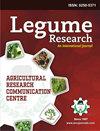Studies on genetic diversity of French bean (Phaseolus vulgaris L.) landraces of Himachal Pradesh based on morphological traits and molecular markers
IF 0.8
4区 生物学
Q3 AGRONOMY
引用次数: 2
Abstract
The knowledge of the extent of underlying diversity in the germplasm can be effectively employed to breed desirable cultivars and to challenge the consequences of the unprecedented biological, physical and chemical stresses of the future growing conditions. In the present study, total 26 geographically diverse French bean genotypes collected from different agro-climatic zones of Himachal Pradesh and two check varieties viz., Baspa and Jawala were grown under randomized complete block design with three replications for deciphering the extent of genetic diversity. The extent of variability was assessed using DUS morphological traits and PCR based approach. Analysis of variance for quantitative traits showed significant differences among all the genotypes for all the characters studied. The genotypes RL-19 and RL-20 gave higher seed yield and performed better for many of the horticultural traits over all the checks. Further, 15 RAPD primers were used for scoring polymorphism at the DNA level. The French bean landraces produced 79 PCR fragments, of which 59 were polymorphic with an average of 3.93 polymorphic fragments per primer. The overall percentage of polymorphism was recorded 74.62 per cent. The average Jaccard similarity index among genotypes ranged from 0.48 to 0.98, thereby showing sufficient genetic variability. Geographical affiliations and morphological associations were observed while studying the genotypic patterns within each group i.e. A, B, C and D. Such variability is desirable in breeding programs. Which also reveal the inherent capacity of the community as a selector, conservator and improver of the potential genetic resource for sustainable future.基于形态特征和分子标记的喜马偕尔邦法国豆地方品种遗传多样性研究
对种质资源潜在多样性程度的了解可以有效地用于培育理想的品种,并挑战未来生长条件中前所未有的生物,物理和化学压力的后果。本研究以喜马偕尔邦(Himachal Pradesh)不同农业气气区收集的26个地理上不同的法国豆基因型和两个对照品种巴斯帕(Baspa)和贾瓦拉(Jawala)为研究对象,采用随机完全区组设计,3个重复进行种植,以了解遗传多样性程度。利用DUS形态性状和PCR方法评估变异程度。数量性状方差分析表明,各基因型间差异显著。基因型RL-19和RL-20的种子产量较高,在许多园艺性状上表现较好。此外,利用15条RAPD引物在DNA水平上对多态性进行评分。法国豆地方品种共产生79个PCR片段,其中多态性片段59个,平均每个引物有3.93个多态性片段。基因型间的平均Jaccard相似指数在0.48 ~ 0.98之间,具有充分的遗传变异性。在研究A、B、C和d组的基因型模式时,观察到地理上的亲缘关系和形态上的关联。这也揭示了社区作为可持续未来潜在遗传资源的选择、保护和改善者的内在能力。
本文章由计算机程序翻译,如有差异,请以英文原文为准。
求助全文
约1分钟内获得全文
求助全文
来源期刊

Legume Research
AGRONOMY-
CiteScore
1.30
自引率
37.50%
发文量
256
审稿时长
6-12 weeks
期刊介绍:
Legume Research An International Journal. The Journal is an official publication of Agricultural Research Communication Centre. It is designed to bring out the original research articles on genetics, breeding, physiology, bacterial avtivity, production, quality, biochemistry and seeds of legumes crops. The objective of the journal is to serve as a forum for scientific community to publish their research findings on legumes ans to provide basis for new research. Journal is being scanned in the important indexing and abstracting services.
 求助内容:
求助内容: 应助结果提醒方式:
应助结果提醒方式:


